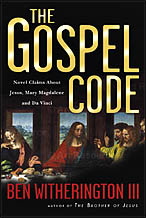Book Notes
 Ben Witherington III, The Gospel Code; Novel Claims About Jesus, Mary Magdalene and Da Vinci (Downers Grove: InterVarsity Press, 2004)
Ben Witherington III, The Gospel Code; Novel Claims About Jesus, Mary Magdalene and Da Vinci (Downers Grove: InterVarsity Press, 2004)
As I write, Dan Brown's The Da Vinci Code ranks number one on the New York Times best seller list. My wife read it to our kids, liked it, and passed it on to a friend. My pastor preached a sermon on it. My neighbor asked me what I thought about it. Now a cottage industry of books debunking it has emerged. That is what happens when your book is on the best seller list for 72 weeks and counting.
It is a little more than ironic that Brown's book is on the fiction list, because on his first page he gives the impression that much if not most of what he has written is based in fact. In reference to Darrell Bock's similar book (below), John Miller of the Wall Street Journal concluded that Brown's "central contentions are based on evidence so thin that calling them conjecture would be a compliment." As Witherington and others have shown, The Da Vinci Code is a mishmash of historical errors of fact, oddball interpretations of the sources, and philosophical or theological assumptions that are interesting but unorthodox to say the least. Toss in great writing, a conspiracy theory about church power brokers who did us dirt, and a biblically illiterate reading public that is nevertheless deeply attracted to Jesus, and you have a recipe for a blockbuster book.
Witherington focuses on seven "deadly historical errors of the book." (1) The supposedly suppressed Gnostic Gospels are earlier than the four canonical Gospels. (2) Jesus was a normal human being who was only much later made out to be divine. (3) The emperor Constantine suppressed the Gnostic gospels and imposed Christian orthodoxy on the masses. (4) Jesus was married to Mary Magdalene. (5) As an early Jew Jesus must have been married. (6) The Dead Sea Scrolls and the Nag Hammadi documents are our earliest Christian documents (Witherington: "so false it's what the British would call a howler."). (7) Various philosophical and theological presuppositions. For a shorter version of Witherington's material see his article in Christianity Today (June 2004), "Why the Lost Gospels Lost Out." Other book-length treatments include Darrell Bock, Breaking the Da Vinci Code, James Garlow and Peter Jones, Cracking Da Vinci's Code, and about a dozen similar titles.


